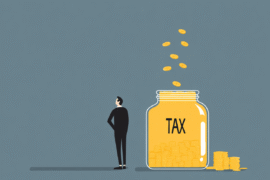This article may contain references to products or services from one or more of our advertisers or partners. We may receive compensation when you click on links to those products or services. Nonetheless, our opinions are our own.
The information presented in this article is accurate to the best of our knowledge at the time of publication. However, information is subject to change, and no guarantees are made about the continued accuracy or completeness of this content after its publication date.
- Introduction
- Legal Protections for Social Security Payments
- When the IRS Can Withhold Social Security Benefits
- Withholding for Family Obligations and Student Loans
- What Private Creditors Are Allowed to Do
- Measures to Protect Monthly Benefits from Collection
- Assistance and Support Options for Benefit Recipients
- Conclusion
- Frequently Asked Questions
- Recommended Reads
Introduction
Social Security benefits are a financial foundation for many individuals. While federal protections shield much of this income from collection, there are circumstances in which part of the benefits may be legally withheld. This explains the laws that govern such situations and how individuals can preserve their funds from collection efforts.
Social Security funds are typically protected from most private debt collectors under federal statutes. However, some obligations, particularly those involving government claims or family-related judgments, may permit partial withholding of benefits.
Types of Debts That May Impact Benefits
| Debt Type | Garnishment Permitted |
|---|---|
| Federal Taxes | Yes |
| Child Support | Yes |
| Alimony | Yes |
| Federal Student Loans | Yes |
| Credit Card Debt | No |
Automatic Protections in Bank Accounts
Federal rules require financial institutions to protect up to two months of Social Security payments that are directly deposited. If benefits are mixed with other funds or deposited by check, it may become more difficult to distinguish protected amounts.
The Internal Revenue Service has the authority to collect unpaid federal taxes by taking a portion of monthly Social Security payments. This action is carried out under the Federal Payment Levy Program, which allows the government to collect a percentage of a recipient’s monthly benefits.
How the IRS Levy Process Works:
- The IRS must issue formal written notices before any action is taken.
- A Final Notice of Intent to Levy and information about the recipient’s right to appeal are typically sent.
- Once the notice period ends, the IRS may begin withholding up to 15 percent of monthly Social Security income.
- Garnishment continues until the debt is paid or resolved.
Steps That May Help Prevent or Limit a Levy:
- Request a hearing to challenge the levy
- Apply for hardship status, which may temporarily stop collection
- Propose a monthly payment arrangement or offer to settle the debt for less
Withholding for Family Obligations and Student Loans
In addition to federal taxes, there are other legally recognized reasons why Social Security income may be partially withheld.
Court-Ordered Family Support
Social Security benefits may be reduced if a court orders payment for:
- Child support, which may result in withholding of up to 65 percent
- Spousal support, if ordered by a family court
These cases are usually enforced through state agencies or court systems.
Education Loan Defaults
Federal law permits garnishment of benefits for unpaid federal student loans. This occurs most commonly in cases where the borrower has defaulted, and no arrangements have been made with the Department of Education.
Voted "Best Overall Budgeting App" by Forbes and WSJ
Monarch Money helps you budget, track spending, set goals, and plan your financial future—all in one app.
Get 50% OFF your first year with code MONARCHVIP
What Private Creditors Are Allowed to Do

Lenders such as banks, medical offices, or credit card companies are not allowed to garnish Social Security income directly. However, after funds are deposited into a bank account, creditors with a legal judgment may try to freeze or collect those funds, depending on how they are managed.
Practical Ways to Protect Deposited Benefits:
- Use a separate bank account only for Social Security payments
- Avoid mixing Social Security funds with income from other sources
- Ensure that benefits are received through direct deposit rather than by paper check
- Monitor your account for any unauthorized collection attempts
Measures to Protect Monthly Benefits from Collection
Being proactive with how Social Security payments are handled can help prevent unnecessary financial hardship or legal disputes.
Recommended Actions:
- Keep funds in a dedicated account that receives no other deposits
- Maintain copies of Social Security award letters and bank statements to verify the source of funds
- Respond promptly to any legal or tax-related communications
- Seek professional legal or financial advice if you receive threats of garnishment or court notices
Handling Legal or IRS Notifications
| Action | Explanation |
|---|---|
| Read notices carefully | Determine who is requesting payment and what type of debt it is |
| Gather relevant records | Prepare bank documents and benefit letters |
| Contact the requesting agency | Clarify details and explore available payment options |
| Keep a written record | Document all communication with agencies or creditors |
Assistance and Support Options for Benefit Recipients
Certain situations may require outside help to resolve complex debt or garnishment issues. Legal, financial, or tax professionals can often provide guidance that prevents more serious consequences.
Situations Where Help May Be Needed:
- When garnishment has already started and is affecting income
- When a creditor or agency attempts to take funds despite protection laws
- When daily living expenses cannot be met because of withheld benefits
Professionals Who May Be Able to Assist:
- Tax experts for resolving debts owed to the IRS
- Legal aid organizations for low-income individuals dealing with family support enforcement
- Consumer attorneys for assistance with improper bank account seizures
Conclusion
Social Security benefits are generally safe, but there are some important exceptions, such as federal taxes, family support orders, and defaulted federal student loans. How benefits are handled is often what makes the difference between protected income and funds at risk. If a creditor or agency questions the funds, it is easier to assert protections if you keep payments in a separate account, don’t mix them with other income, and keep clear records (like award letters and bank statements). If you get a notice from the IRS, a court, or a state agency, respond right away and use the options available to you, such as appeals, hardship requests, installment agreements, or negotiated resolutions, to stop or lower withholdings. If your wages are already being garnished or your bank account is frozen, get help from tax professionals, legal aid, or consumer attorneys to protect your important income and get your money back. Most beneficiaries can avoid problems and keep the monthly support these benefits are meant to provide by managing their accounts proactively, communicating on time, and getting good advice.
Frequently Asked Questions
Yes. If there is unpaid federal tax debt, the IRS may take up to 15 percent of monthly benefits under current regulations.
No. Benefits are protected from most unsecured debts. However, if funds are not kept separate, creditors may be able to freeze or access them under a court judgment.
This depends on the type of debt:
- Federal tax debts may result in a 15 percent levy
- Child support obligations may allow up to 65 percent
- Private debts generally cannot result in garnishment without a judgment
How can I stop or reduce garnishment?
Use a separate account for Social Security funds, respond to notices quickly, and work with a legal or tax professional to challenge or negotiate the debt.

Reviewed and edited by Albert Fang.
See a typo or want to suggest an edit/revision to the content? Use the contact us form to provide feedback.
At FangWallet, we value editorial integrity and open collaboration in curating quality content for readers to enjoy. Much appreciated for the assist.
Did you like our article and find it insightful? We encourage sharing the article link with family and friends to benefit as well - better yet, sharing on social media. Thank you for the support! 🍉
Article Title: Can the IRS or Creditors Take Your Social Security Income
https://fangwallet.com/2025/09/20/can-the-irs-or-creditors-take-your-social-security-income/The FangWallet Promise
FangWallet is an editorially independent resource - founded on breaking down challenging financial concepts for anyone to understand since 2014. While we adhere to editorial integrity, note that this post may contain references to products from our partners.
The FangWallet promise is always to have your best interest in mind and be transparent and honest about the financial picture.
Become an Insider

Subscribe to get a free daily budget planner printable to help get your money on track!
Make passive money the right way. No spam.
Editorial Disclaimer: The editorial content on this page is not provided by any of the companies mentioned. The opinions expressed here are the author's alone.
The content of this website is for informational purposes only and does not represent investment advice, or an offer or solicitation to buy or sell any security, investment, or product. Investors are encouraged to do their own due diligence, and, if necessary, consult professional advising before making any investment decisions. Investing involves a high degree of risk, and financial losses may occur including the potential loss of principal.
Source Citation References:
+ Inspo
Harvey, C., & Zhong, M. (2024). Comment Letter to IRS Regarding Implementation of Saver's Match Contributions. Urban Institute.












































